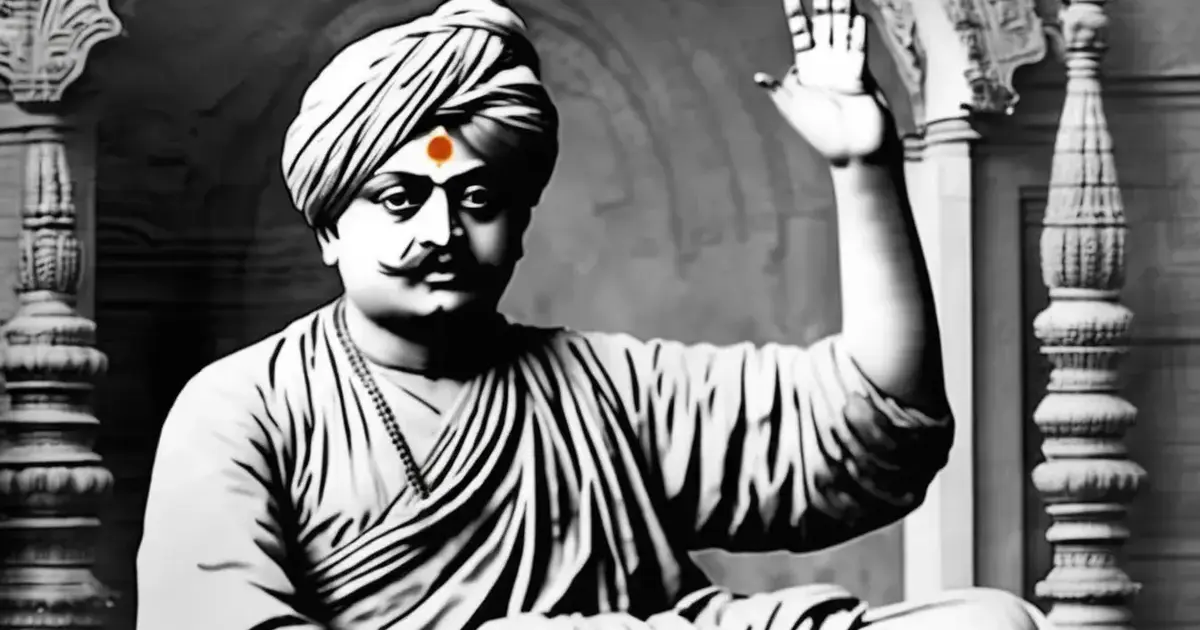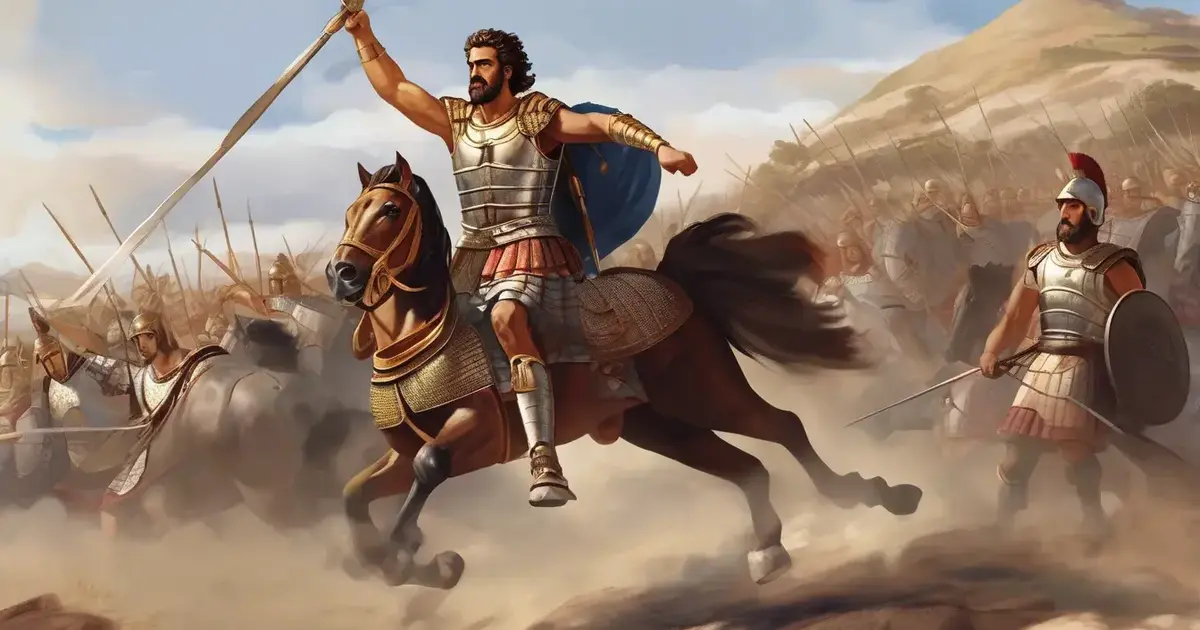Swami Vivekananda, a prominent Indian monk, was approximately 5 feet 8 inches tall. He had a robust build, and his weight varied throughout his life. Net worth is not applicable to him as he renounced material wealth. He was born Narendranath Datta on January 12, 1863, in Kolkata, India, to parents Vishwanath Datta and Bhuvaneswari Devi.
He achieved global recognition for his spiritual teachings and founded the Ramakrishna Mission. Swami Vivekananda, a towering personality in philosophical and spiritual realms, significantly impacted Indian society. He stood approximately 5 feet 8 inches tall and had a robust build reflective of his disciplined lifestyle. His weight varied throughout his life.
Diving into personal details, it’s noteworthy to mention that Vivekananda belonged to the 19th century, a period where modern concepts like “net worth” were not attributed to spiritual leaders. Instead, his “wealth” was measured by the profound knowledge and wisdom he imparted. Consistent with his teachings, material wealth was never a priority for him.
Quick Info about Swami Vivekananda
Swami Vivekananda was a famous monk from India. He helped spread the teachings of Vedanta and Yoga in the West. Here are some quick facts about him.
| Quick Info | Details |
|---|---|
| Height | 5 feet 8 inches |
| Weight | Varied throughout his life |
| Age | Lived from 1863 to 1902 |
| Wife | Never married |
| Net Worth | Not applicable |
Full Biography of Swami Vivekananda
Swami Vivekananda was a renowned Indian monk. He played a key role in spreading Indian philosophies of Vedanta and Yoga to the Western world. Below is a detailed overview of his life.
| Information | Details |
|---|---|
| Swami Vivekananda Name | Narendranath Datta |
| Nickname | Swamiji |
| Profession | Monk, Philosopher |
| Date of Birth | January 12, 1863 |
| Age | Lived 39 years |
| Net Worth | Not applicable |
| Height | 5 feet 8 inches |
| Weight | Varied |
| Body Measurement | Not documented |
| Eye Color | Dark Brown |
| Hair Color | Black |
| Birthplace/Hometown | Kolkata, India |
| Nationality | Indian |
| Gender | Male |
| Ethnicity | Bengali |
| Religion | Hinduism |
| Sexuality | Not documented |
| Sun Sign (Zodiac Birth Sign) | Capricorn |
| House Location | Kolkata, India |
| Wiki Page | Swami Vivekananda Wiki |
| Facebook Link | Not applicable |
| Twitter Profile Link | Not applicable |
Physical Statistics
Swami Vivekananda was known for his impressive physical presence. He had a strong build which reflected his disciplined lifestyle. Below are some key physical statistics about him.
| Information | Details |
|---|---|
| Height (Tall) | 5 feet 8 inches |
| Weight | Varied |
| Profession | Monk, Philosopher |
| Eye Color | Dark Brown |
| Shoe Size (UK) | Not documented |
| Hair Color | Black |
Family Background
Swami Vivekananda came from a well-educated and respected family. His upbringing played a vital role in shaping his philosophical and spiritual outlook. Let’s look at his family background.
| Information | Details |
|---|---|
| Parents | Vishwanath Datta (Father), Bhuvaneswari Devi (Mother) |
| Siblings | 10 siblings; some of them were Jogendranath Datta, Mahendranath Datta |
Height, Weight, Net Worth, Personal Details, Income, Family, Professional Achievements of Swami Vivekananda
Swami Vivekananda was an influential Indian monk known for his profound teachings and spiritual insights. This section delves into various aspects of his life including his physical attributes, personal life, and significant accomplishments.
Height and Weight
Swami Vivekananda stood tall at 5 feet 8 inches. He had a sturdy build, which was a testament to his disciplined lifestyle and regular physical activity. His weight varied throughout his life as he embarked on various spiritual journeys. Maintaining his physical health was important to him.
His robust frame was matched by his mental strength, making him a compelling personality. People often remarked on his powerful presence and commanding voice. In addition to his height and weight, his overall health was remarkable given the rigorous spiritual practices he followed. These physical attributes helped him become a respected figure worldwide, especially during his travels.
Net Worth and Personal Details
Swami Vivekananda did not accumulate material wealth. His “net worth” was measured by the knowledge and wisdom he imparted to the world. Vivekananda valued spiritual wealth over material possessions. He was born as Narendranath Datta on January 12, 1863, in Kolkata, India. His family was well-respected and played a significant role in shaping his early life.
His spiritual journey began at a young age, influenced by many factors including his family’s teachings. Swami Vivekananda never married, dedicating his life entirely to spiritual pursuits. His primary focus was on spreading the teachings of Vedanta and Yoga to both his native India and the Western world.
Income
As a monk, Swami Vivekananda had no personal income. He renounced the worldly life, focusing solely on his spiritual mission. He relied on the support of his followers and patrons. During his travels, especially in the West, he received donations and support to sustain his activities. These donations were used to establish institutions and support spiritual education. His primary concern was the welfare of his fellow beings, not material gain. His efforts led to the establishment of the Ramakrishna Mission. This organization continues to work for social and spiritual upliftment, reflecting his values and teachings.
Family Background
Swami Vivekananda was born into a well-educated family. His father, Vishwanath Datta, was an attorney at the Calcutta High Court, and his mother, Bhuvaneswari Devi, was known for her devout spiritual nature.
Vivekananda had 10 siblings, with whom he shared a close bond. His family’s intellectual and spiritual environment profoundly influenced his early years. Despite his close family ties, he chose a life of renunciation. His family supported his decision, understanding his deep spiritual calling.
Professional Achievements
Swami Vivekananda’s professional achievements are noteworthy. He rose to fame after his speech at the Parliament of the World’s Religions in Chicago in 1893. His “Brothers and Sisters of America” address remains iconic. He founded the Ramakrishna Mission in 1897, aiming to promote spiritual growth and social welfare. This organization has since grown considerably, continuing to serve people worldwide. Through his teachings, writings, and lectures, Vivekananda inspired many to pursue a life of spirituality and service. His contributions to both Indian and global spiritual landscapes are everlasting.
Some Lesser Known Facts About Swami Vivekananda
Swami Vivekananda was a prominent spiritual leader, but there are many lesser-known facts about him. These details help paint a full picture of his remarkable life. Here are some interesting tidbits about Swami Vivekananda.
- Swami Vivekananda’s birth name was Narendranath Datta.
- He met his spiritual teacher, Ramakrishna, at the age of 18.
- He was known for his powerful memory and could recall subjects he had read years before.
- Vivekananda was proficient in several languages, including Bengali, Sanskrit, and English.
- He was an accomplished musician and used to play the classical Indian instrument, the sitar.
- Despite being a monk, Vivekananda was very interested in science and technology.
- He was the first Hindu monk to visit the Western world.
- Swami Vivekananda emphasized the importance of physical exercise and used to practice yoga regularly.
- He passed away at the young age of 39, predicting his own death.
- His teachings inspired several freedom fighters in India, including Mahatma Gandhi and Subhas Chandra Bose.
The Teachings and Principles of Swami Vivekananda
Swami Vivekananda’s teachings focus on the importance of spirituality in daily life. He believed that true religion goes beyond rituals and is deeply personal. His ideas encourage individuals to seek inner strength and wisdom.
One of his core principles was the concept of “Atman,” or the soul. Swami Vivekananda taught that every person is inherently divine and should strive to realize this truth. This principle was central to his message and his mission.
Swami Vivekananda also emphasized the importance of serving others. He believed that selfless service, or “Karma Yoga,” is a way to achieve spiritual growth. Helping others, according to him, was as vital as meditation.
Another key teaching was the unity of all religions. Swami Vivekananda held that every religion is a valid path to God. He taught that we should respect and learn from different faiths.
Swami Vivekananda was a strong advocate for education. He believed education should focus on building character and instilling values. He argued that true education empowers individuals to become self-reliant.
His teachings continue to inspire millions around the world. Swami Vivekananda’s messages focus on self-improvement, spiritual growth, and social service, making them timeless. His principles remain relevant in today’s rapidly changing world.
Swami Vivekananda’s Impact on Society and Culture
Swami Vivekananda had a profound impact on society and culture, both in India and around the world. He is credited with bringing spirituality and human values to the forefront of modern thought. His contributions continue to influence various sectors.
One significant impact he had was the revival of Hinduism. Swami Vivekananda’s teachings helped reawaken interest in ancient Indian traditions. He made Hindu philosophy more accessible to the common people.
Swami Vivekananda also promoted the idea of universal brotherhood. He emphasized that all humans are interconnected, which encouraged people to look beyond national and racial boundaries. This idea fostered a greater sense of global unity.
In the realm of education, his views have been transformative. Swami Vivekananda advocated for an education system that focuses on overall human development. Many educational institutions in India follow his principles even today.
His impact isn’t limited to India alone. Swami Vivekananda’s speeches at international platforms, like the Parliament of the World’s Religions, brought Indian spirituality to global attention. He helped bridge the gap between Eastern and Western philosophies.
Moreover, his teachings on service and social responsibility have led to many humanitarian initiatives. Organizations inspired by Swami Vivekananda work towards uplifting underprivileged communities. His legacy lives on through these acts of kindness and service.
Frequently Asked Questions
Swami Vivekananda, a revered Indian monk, has captivated minds globally with his teachings and life story. Here are some common questions about his life, achievements, and personal details.
What is Swami Vivekananda’s real name?
Swami Vivekananda was born as Narendranath Datta on January 12, 1863. He later took on the monastic name “Vivekananda” after joining the monastic order of his guru, Sri Ramakrishna.
This name, given around 1886, signifies the joy of discernment and wisdom. His journey from Narendranath to Swami Vivekananda is filled with spiritual exploration and profound insights.
Did Swami Vivekananda ever marry or have any romantic relationships?
Swami Vivekananda did not marry or engage in romantic relationships. He dedicated his life entirely to spiritual pursuits and serving humanity.
His celibacy and commitment to a monastic lifestyle were deeply rooted in his belief in renunciation and spiritual discipline. This path allowed him to focus fully on his mission.
How tall was Swami Vivekananda?
Swami Vivekananda stood approximately 5 feet 8 inches tall. His height, combined with his strong build, made him a striking figure during his lifetime.
He maintained good physical health through exercise and spiritual practices. His towering personality was as much about his physical presence as it was about his moral and intellectual stature.
What were some of Swami Vivekananda’s professional achievements?
One of Swami Vivekananda’s notable achievements was his speech at the Parliament of the World’s Religions in Chicago in 1893. This speech brought him international acclaim and introduced Indian philosophies to the Western world.
He also founded the Ramakrishna Mission, which continues to engage in social service and spiritual education. His writings, lectures, and the institutions he established have left a lasting impact on both Eastern and Western societies.
Can you tell us more about Swami Vivekananda’s family background?
Swami Vivekananda came from a well-respected family in Kolkata, India. His father, Vishwanath Datta, was an attorney known for his progressive views, and his mother, Bhuvaneswari Devi, was deeply spiritual.
He had 10 siblings and grew up in an environment that balanced intellectual engagement and spiritual devotion. This family background played a significant role in shaping his future as a spiritual leader.
Final Reflections on Swami Vivekananda
Swami Vivekananda’s life was a synthesis of profound spirituality and practical wisdom. His teachings continue to inspire countless individuals across the globe. He remains a timeless figure whose messages resonate even more today.
From his towering presence to his humble renunciation, Vivekananda’s legacy is diverse and impactful. His contributions to spirituality, education, and social welfare are unparalleled. Swami Vivekananda truly epitomized the ideals of selflessness and enlightenment.




